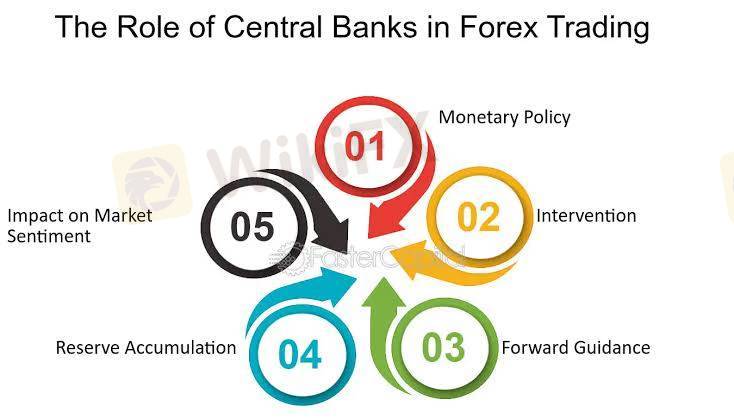
2025-02-12 20:28
IndustriThe impact of central bank policy on forex market
#firstdealofthenewyearastylz
The Impact of Central Bank Policy on Forex Market
Introduction
The foreign exchange (forex) market is a dynamic and highly volatile environment, influenced by a multitude of factors. Among these, central bank policy plays a crucial role in shaping the market's trajectory. Central banks, responsible for managing a nation's monetary policy, implement decisions that significantly impact currency values, trading volumes, and market sentiment.
Monetary Policy Tools
Central banks employ various monetary policy tools to achieve their objectives, including:
1. *Interest Rates*: Adjusting interest rates influences borrowing costs, consumption, and investment, ultimately affecting currency demand and value.
2. *Quantitative Easing (QE)*: Central banks create new money to purchase assets, injecting liquidity into the economy and influencing currency values.
3. *Forward Guidance*: Communicating future policy intentions helps shape market expectations, influencing currency prices.
Impact on Forex Market
Central bank policy decisions have far-reaching consequences for the forex market:
1. *Currency Volatility*: Changes in interest rates, QE, or forward guidance can lead to significant currency fluctuations, creating opportunities and challenges for traders.
2. *Currency Strength*: A central bank's decision to raise interest rates or implement hawkish policies can strengthen its currency, while dovish policies can weaken it.
3. *Trade Volumes*: Central bank policy announcements can increase trading volumes, as market participants react to new information and adjust their positions.
4. *Market Sentiment*: Central bank communication can influence market sentiment, with hawkish or dovish tones impacting investor confidence and risk appetite.
Examples and Case Studies
1. *Federal Reserve (Fed)*: The Fed's decision to raise interest rates in 2015 strengthened the US dollar, while its subsequent rate cuts in 2020 weakened the currency.
2. *European Central Bank (ECB)*: The ECB's implementation of QE in 2015 boosted the eurozone economy but weakened the euro currency.
3. *Bank of Japan (BoJ)*: The BoJ's adoption of negative interest rates in 2016 aimed to stimulate the Japanese economy but had limited impact on the yen currency.
Conclusion
Central bank policy has a profound impact on the forex market, influencing currency values, trading volumes, and market sentiment. Understanding central bank decisions and communication is crucial for traders, investors, and policymakers to navigate the complex and dynamic forex market. By analyzing central bank policy, market participants can make informed decisions, manage risk, and capitalize on opportunities in the ever-changing forex landscape.
Suka 0

Vic.d
Brokers
Diskusi populer
Industri
СЕКРЕТ ЖЕНСКОГО ФОРЕКСА
Industri
УКРАИНА СОБИРАЕТСЯ СТАТЬ ЛИДЕРОМ НА РЫНКЕ NFT
Industri
Alasan Investasi Bodong Tumbuh Subur di Indonesia
Industri
Forex Eropa EURUSD 29 Maret: Berusaha Naik dari Terendah 4 Bulan
Analisis pasar
Bursa Asia Kebakaran, Eh... IHSG Ikut-ikutan
Analisis pasar
Kinerja BUMN Karya Disinggung Dahlan Iskan, Sahamnya Pada Rontok
Klasifikasi pasar

Platform

Pameran

Agen

Perekrutan

EA

Industri

Pasar

Indeks
The impact of central bank policy on forex market
 Hong Kong | 2025-02-12 20:28
Hong Kong | 2025-02-12 20:28#firstdealofthenewyearastylz
The Impact of Central Bank Policy on Forex Market
Introduction
The foreign exchange (forex) market is a dynamic and highly volatile environment, influenced by a multitude of factors. Among these, central bank policy plays a crucial role in shaping the market's trajectory. Central banks, responsible for managing a nation's monetary policy, implement decisions that significantly impact currency values, trading volumes, and market sentiment.
Monetary Policy Tools
Central banks employ various monetary policy tools to achieve their objectives, including:
1. *Interest Rates*: Adjusting interest rates influences borrowing costs, consumption, and investment, ultimately affecting currency demand and value.
2. *Quantitative Easing (QE)*: Central banks create new money to purchase assets, injecting liquidity into the economy and influencing currency values.
3. *Forward Guidance*: Communicating future policy intentions helps shape market expectations, influencing currency prices.
Impact on Forex Market
Central bank policy decisions have far-reaching consequences for the forex market:
1. *Currency Volatility*: Changes in interest rates, QE, or forward guidance can lead to significant currency fluctuations, creating opportunities and challenges for traders.
2. *Currency Strength*: A central bank's decision to raise interest rates or implement hawkish policies can strengthen its currency, while dovish policies can weaken it.
3. *Trade Volumes*: Central bank policy announcements can increase trading volumes, as market participants react to new information and adjust their positions.
4. *Market Sentiment*: Central bank communication can influence market sentiment, with hawkish or dovish tones impacting investor confidence and risk appetite.
Examples and Case Studies
1. *Federal Reserve (Fed)*: The Fed's decision to raise interest rates in 2015 strengthened the US dollar, while its subsequent rate cuts in 2020 weakened the currency.
2. *European Central Bank (ECB)*: The ECB's implementation of QE in 2015 boosted the eurozone economy but weakened the euro currency.
3. *Bank of Japan (BoJ)*: The BoJ's adoption of negative interest rates in 2016 aimed to stimulate the Japanese economy but had limited impact on the yen currency.
Conclusion
Central bank policy has a profound impact on the forex market, influencing currency values, trading volumes, and market sentiment. Understanding central bank decisions and communication is crucial for traders, investors, and policymakers to navigate the complex and dynamic forex market. By analyzing central bank policy, market participants can make informed decisions, manage risk, and capitalize on opportunities in the ever-changing forex landscape.
Suka 0
Saya juga ingin komentar
Tanyakan pertanyaan
0Komentar

Belum ada yang berkomentar, segera jadi yang pertama

Tanyakan pertanyaan
Belum ada yang berkomentar, segera jadi yang pertama